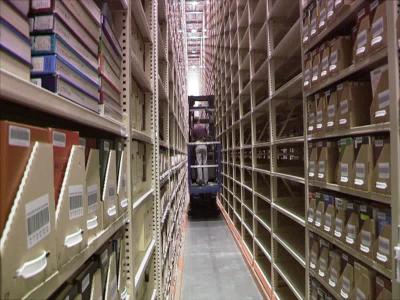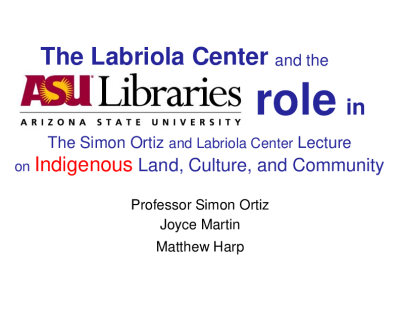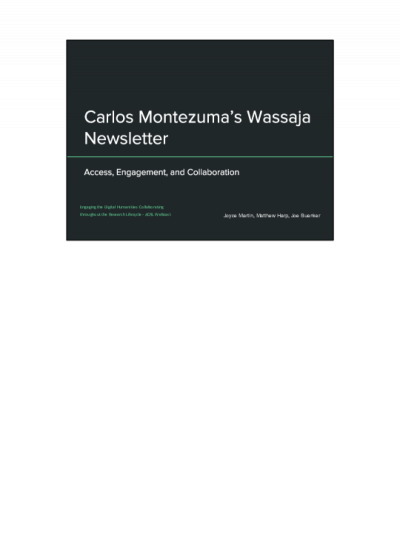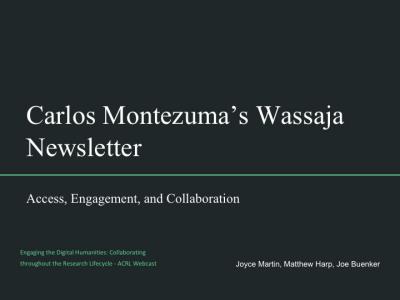Filtering by
- Creators: Varsani, Arvind
In 2014/2015, Arizona State University (ASU) Libraries, the Labriola National American Indian Data Center, and the ASU American Indian Studies Department completed an ASU Institute for Humanities Research (IHR) seed grant entitled “Carlos Montezuma’s Wassaja Newsletter: Digitization, Access and Context” to digitize all ASU held issues of the newsletter Wassaja Freedom’s Signal for the Indian, which Yavapai activist-intellectual Carlos Montezuma, MD (1866-1923) self-published during 1916-1922. The grant team additionally selected a portion of the ASU Libraries Carlos Montezuma archival collection for digitization to provide a more complete picture of Dr. Carlos Montezuma’s life and work.
The ASU grant team produced a searchable online collection on the ASU Digital Repository and created an online exhibition in conjunction with the IHR Nexus Lab’s Developing Wassaja Project. The Nexus Lab’s role at ASU is to grow the digital humanities through interdisciplinary collaborations bringing together humanities, science, and technology. The Nexus Lab partnered with the grant team to create the Developing Wassaja Project which provided an opportunity for faculty, staff, and students at ASU to engage in electronic publication through web application development.
The resulting web platform, Wassaja: A Carlos Montezuma Project, provides context for this digitized collection and facilitates community interaction, including a partnership with Dr. Montezuma’s home community the Fort McDowell Yavapai Nation. In this webcast, Digital Projects Librarian Matthew Harp, Developing Wassaja Project team member Joe Buenker (subject librarian), and grant team member Joyce Martin (librarian and curator of the Labriola National American Indian Data Center) will discuss and demonstrate the resources created and the resulting partnership with the Fort McDowell Yavapai Nation. The webcast will focus on identifying collaborators and needed skills to engage in Digital Humanities research and on identifying the stages of a collaborative project.
Participants will gain insight on working directly with diverse communities; overcoming technical limitations of traditional institutional repositories; collaborative strategies with faculty, research centers, and cultural heritage societies; solutions for moving hidden collections into an engaging digital exhibition; integrating digital humanities research and instruction with library curation; and preparing for long term costs and management issues.

Anthropology librarian Juliann Couture and Joyce Martin, curator of the Labriola National American Indian Data Center, looking at the Center's display of unique Hopi Kachina dolls. Four of the kachinas (Navan Kachina; Talavi Kachina; Flute Kachina; and Ahöla Kachina) were created by artist, carver, and former ASU employee Tony Dukepoo as a gift to the libraries in 1979. The kachina dolls are on display in the Labriola Center located on the 2nd floor of the Hayden Library on ASU's Tempe campus.

The Simon Ortiz and Labriola Center Lecture on Indigenous Land, Culture, and Community addresses topics and issues across disciplines in the arts, humanities, sciences, and politics. Underscoring Indigenous American experiences and perspectives, this Series seeks to create and celebrate knowledge that evolves from an Indigenous worldview that is inclusive and that is applicable to all walks of life.” Professor Simon Ortiz discussed the overall nature of the Series, especially emphasizing the global nature of Indigenous concerns. Joyce Martin and Matthew Harp elaborated on the contributions of the Labriola National American Indian Data Center and ASU Libraries to the Series.
The Labriola Center hosts an informal event in Hayden Library which facilitates close interaction between the featured speaker and audience members. The ASU Libraries records the evening lectures which take place at the Heard Museum and presents both an audio podcast and streaming video of each lecture on the ASU Library Channel webpage. This lecture series provides not only a chance for community discussion at the events themselves, but through the innovative use of technology the ASU Libraries enables additional forums for discussion in blogs and web pages which choose to link to the streaming videos.



A new genomovirus has been identified in three common bean plants in Brazil. This virus has a circular genome of 2,220 nucleotides and 3 major open reading frames. It shares 80.7% genome-wide pairwise identity with a genomovirus recovered from Tongan fruit bat guano.

Here we report the first complete genome sequence of a cauliflower mosaic virus from Brazil, obtained from the gut content of the predator earwig (Doru luteipes). This virus has a genome of 8,030 nucleotides (nt) and shares 97% genome-wide identity with an isolate from Argentina.

Implementation of a vector-enabled metagenomics approach resulted in the identification of various gemini viruses. We identified the genome sequences of beet curly top Iran virus, turnip curly top viruses, oat dwarf viruses, the first from Iran, and wheat dwarf virus from leafhoppers feeding on beet, parsley, pumpkin, and turnip plants.

Metagenomic approaches are rapidly expanding our knowledge of the diversity of viruses. In the fecal matter of Nigerian chimpanzees we recovered three gokushovirus genomes, one circular replication-associated protein encoding single-stranded DNA virus (CRESS), and a CRESS DNA molecule.

Four genomovirus genomes were recovered from thrips (Echinothrips americanus) collected in Florida, USA. These represent four new species which are members of the Gemycircularvirus (n = 2), Gemyduguivirus (n = 1), and Gemykibivirus (n = 1) genera. This is the first record, to our knowledge, of genomoviruses associated with a phytophagous insect.
